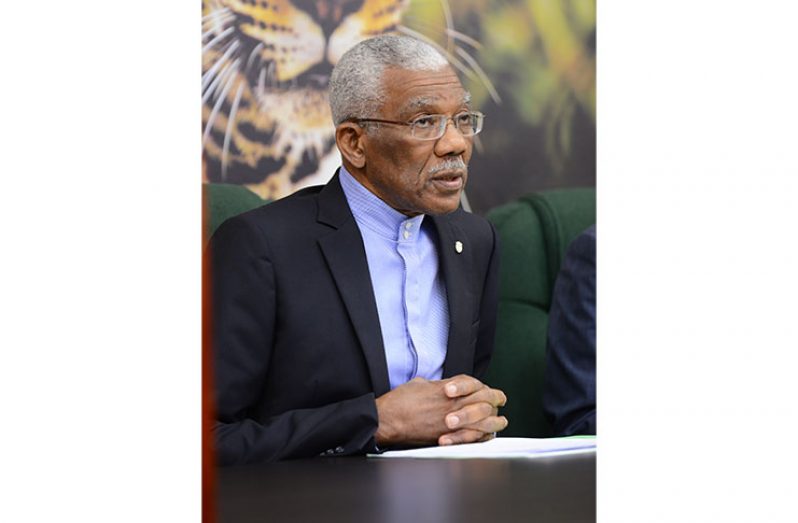AHEAD of the August 14 High Court decision on the legality of the ongoing House-to-House Registration, President David Granger said his government is prepared to accept any decision that would result in credible, free, and fair elections.
“As Leader of the People’s National Congress/Reform, as Chairman of the A Partnership for National Unity, and as President of Guyana, we are interested in credible elections, and this has been said repeatedly, and that is what we are aiming at. So we will accept any formula, any rule or any decision which satisfies the requirements for credible elections,” President Granger told journalists.
At the time, the Head of State was responding to a question during a press conference at the Ministry of the Presidency on Thursday. He met with the press shortly after his meeting with the Guyana Elections Commission (GECOM). Though not explicitly stating that the government will challenge the High Court’s decision if it rules that the national registration exercise should be halted, the President said his government will take legal actions to ensure credible elections are held. “We are ready to pursue any legal action that we feel would lead to a favourable outcome to have credible elections in Guyana. Our concern is with credible elections, and we have said over and over again that if the list is flawed it must be corrected,” President Granger said.
He noted that it is for the Elections Commission to decide how it will correct that list.
President Granger, in endorsing GECOM’s decision to embark on House-to-House Registration, has long said that the now expired List of Electors is bloated with the names of approximately 200,000 persons who are either dead or not resident in Guyana.
In the High Court, where government, through Attorney-General Basil Williams, is named as a respondent in the challenge to House-to-House Registration, it has been argued that the national registration exercise is necessary to facilitate credible elections at this stage.
Earlier this week, as arguments wrapped up in the case brought by Chartered Accountant Christopher Ram, the Attorney-General pleaded with the High Court to allow the Elections Commission to complete House-to-House Registration before General and Regional Elections are held, noting that the Commission needs “couple more weeks” to conclude the exercise. .
Approximately 150,000 persons have been registered since the national exercise commenced on July 20. It is expected to end on October 20, 2019. The Attorney-General told the High Court that the results desired from House-to-House Registration cannot be produced by simply doing Claims and Objections as requested by the Opposition.
In fact, he said, were GECOM to abandon the exercise and resort to Claims and Objections, it would be a herculean task to respond to every claim and every objection within a period of two weeks. “If someone makes a claim or an objection, there has to be a hearing. So how are you going to adopt if we start with 20,000 or 50,000 objections, within two weeks,” the Attorney- General reasoned.
In support of his argument, the Attorney-General took the court through the many changes the National Registration Act underwent to pave the way for the conduct of House-to-House Registration – a process, he argued, is mandatory every 10 years by a decision of the Elections Commission. He said it was on that basis that the Elections Commission, in 2018, took a decision to conduct House-to-House Registration in 2019.
In addition to challenging the exercise, the Opposition, through Ram, asked the High Court to issue an order compelling GECOM to conduct elections on or before September 18, but Solicitor General Nigel Hawke, in representing the Attorney-General, argued that the applicant is asking the High Court to issue an order that the Caribbean Court of Justice (CCJ) did not grant when it ruled on the No-Confidence Motion.
The CCJ, he reminded, had indicated that it cannot issue coercive orders or detailed directives instructing the President, the National Assembly and implicitly GECOM, how it should act. According to the CCJ, Guyana’s Constitution stipulates that only the President, the National Assembly and by extension GECOM can dictate the precise timing of the elections.
Chief Justice (ag) Roxane George-Wiltshire will hand down her decision in the matter on Wednesday, August 14, 2019.



.jpg)








